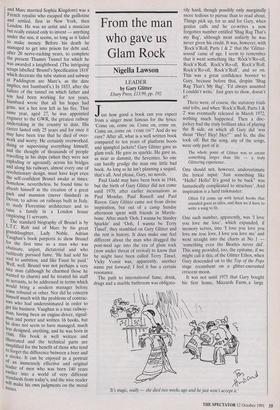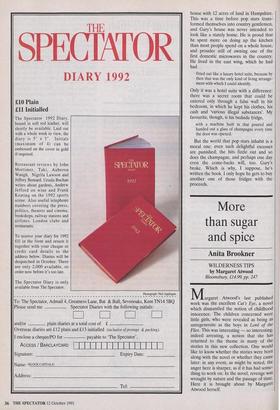From the man who gave us Glam Rock
Nigella Lawson
LEADER by Gary Glitter Ebuty Press, £13.99, pp. 192 Just how good a book can you expect from a singer most famous for the lyrics: `Come on, come on. Come on, come on. Come on, come on. COME ON'? And do we care? After all, what is a well written book compared to ten years of platform boots and spangled jackets? Gary Glitter gave us glam rock. He gave us sparkle. He gave us, as near as dammit, the Seventies. So one can hardly grudge the man one little bad book. As long as he isn't planning a sequel, that's all. And please, Gary, no novels. Paul Gadd may have been born in 1944, but the birth of Gary Glitter did not come until 1970, after earlier incarnations as Paul Monday, Paul Russell and Paul Raven. Gary Glitter came not from divine inspiration, but out of a camp Sunday afternoon spent with friends in Maryle- bone. After much 'Ooh, I wanna be Stanley Sparkle' and 'Ooh, I wanna be Terry Tinsel', they stumbled on Gary Glitter and the rest is history. It does make one feel different about the man who dragged the post-mod age into the era of glam rock (now under threat of revival) to know that he might have been called Terry Tinsel. Vicky Vomit was, apparently, another name put forward; I feel it has a certain resonance.
The path to international fame, drink, drugs and a marble bathroom was obligato- rily hard, though possibly only marginally more tedious to pursue than to read about. Things pick up, for us and for Gary, when genius calls and he co-writes a now forgotten number entitled 'Shag Rag That's my Bag', although most unfairly he was never given his credit. It was, however, with `Rock'n'Roll, Parts 1 & 2' that the 'Glitter- sound' came of age. I seem to remember that it went something like `ROck'n'Ro-oll, Rock'n'Roll. Rock'n'Ro-oll, Rock'n'Roll. Rock'n'Ro-oll, Rock'n'Roll', and so on. This was a great confidence booster to Gary, because before that, despite 'Shag Rag That's My Bag', 'I'd always assumed I couldn't write.' Just goes to show, doesn't it?
There were, of course, the statutory trials and tribs, and when `Rock'n'Roll, Parts 1 & 2' was eventually released in March 1972, nothing much happened. Then a disc- jockey had the truly brilliant idea of playing the B side, on which all Gary did 'was shout "Hey! Hey! Hey!"' and lo, the disc took off. But the song, any of the songs, were only part of it:
The whole point of Glitter was to create something larger than life — a truly Glittering experience.
One should not, however, underestimate the lyrical input: 'Just something like "Hello! Hello! It's good to be back" was fantastically complicated to structure'. And inspiration is a hard taskmaster:
Often I'd come up with lyrical hooks that sounded good as titles, and then we'd have to write a song to fit.
One such number, apparently, was 'I love you love me love', which expanded, if memory serves, into 'I love you love you love me true love. I love you love me' and went straight into the charts at No 1 'something even the Beatles never did'. This song provided, too, the epitome, if we might call it this, of the Glitter Ethos, when Gary descended on to the Top of the Pops stage recumbent on a glitter-encrusted crescent moon.
It was not until 1975 that Gary bought his first home, Mizzards Farm, a large `It's tragic, really — she died two weeks ago and he just won't accept it.' house with 12 acres of land in Hampshire. This was a time before pop stars trans- formed themselves into country gentlemen, and Gary's house was never intended to look like a stately home. He is proud that he spent more on doing up the kitchen than most people spend on a whole house, and prouder still of owning one of the first domestic microwaves in the country. He lived in the east wing, which he had had
fitted out like a luxury hotel suite, because by then that was the only kind of living arrange- ment with which I could identify.
Only it was a hotel suite with a difference: there was a secret room that could be entered only through a false wall in his bedroom, in which he kept his clothes, his cash and 'various illegal substances'. My favourite, though, is his bedside fridge,
with a machine built in that poured and handed out a glass of champagne every time the door was opened.
But the world that pop stars inhabit is a moral one: even such delightful excesses are punished; the hits fizzle out and so does the champagne, and perhaps one day even the come-backs will, too. Gary's broke. Which is why, I suppose, he's written the book. I only hope he gets to buy another one of those fridges with the proceeds.



























































 Previous page
Previous page